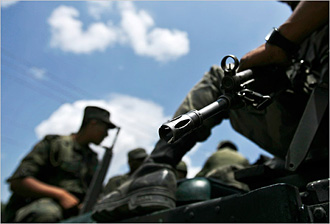
|
 |
 |
 Americas & Beyond | May 2008 Americas & Beyond | May 2008  
US Congress Trims Bush’s Mexico Drug Plan
 Marc Lacey - New York Times Marc Lacey - New York Times
go to original


| | Soldiers patrolling Culiacán, in Sinaloa State. Drug-related deaths in Mexico are about 1,200 so far this year. (Guillermo Arias/Associated Press) | | |
Mexico City — The United States Congress has scaled back on President Bush’s anti-drug plans for Mexico and put human rights conditions on some of the aid, drawing fire from some Mexicans who accuse American lawmakers of meddling in their country’s internal affairs.

As part of a broader emergency appropriations bill that remains under discussion and could face a presidential veto, the Senate on Thursday approved $350 million to aid Mexico in what has become a pitched battle against drug trafficking. The Senate would also give $100 million to countries in Central America that are in drug wars of their own, as well as to the Dominican Republic and Haiti.

Besides reducing the Bush administration’s request, which would have sent $500 million to Mexico and $50 million to Central America, the Senate adopted language similar to that in a recently passed House bill that would hold up a quarter of the money until the State Department ruled that Mexico was meeting certain human rights markers. The House approved $400 million for Mexico, one of several differences that will be worked out in a House-Senate conference in the coming weeks.

The Senate measure still represents a major increase in aid to Mexico in a single year, legislative aides said, reflecting bipartisan concern over the fact that an estimated 90 percent of the cocaine entering the United States comes through Mexican territory.

But at issue is the performance of Mexico’s army and the police, which have been accused by human rights organizations of engaging in abuses as they chase down the country’s drug cartels.

“Human rights abuses in the army are routinely investigated by the military itself, and that leads to impunity,” said Tamara Taraciuk, Mexico researcher for Human Rights Watch. “The big issue is accountability.”

To address that, the Congressional plans ask the secretary of state to report on whether Mexico was prohibiting testimony obtained through torture and trying soldiers accused of abuses in civilian courts, among other conditions.

Since President Felipe Calderón of Mexico started his drug war in 2007, more than 200 law enforcement officers have been killed, among them at least two dozen top commanders. The overall body count is estimated to be 1,300 people so far this year, on track to exceed the roughly 2,500 drug-related killings in 2007.

The Bush administration has pointed to a recent surge of violence as evidence of the need for the so-called Mérida Initiative, which is the name given to the spending deal struck last year by Mr. Bush and Mr. Calderón. But Congress was left out of the initial deal making, resulting in hard feelings when Mr. Bush submitted the plan.

The trims to the president’s plan, and the strings attached by lawmakers in Washington, clearly irked some Mexicans. The Mexican government was working behind the scenes in Washington to soften some of the legislative language, Congressional aides said. The newspaper La Jornada said in an editorial this week that it was “a grotesque and absurd pretension” that the United States, which has human rights issues of its own in its detention facility in Guantánamo Bay, Cuba, should be scrutinizing Mexico’s armed forces.

Senator Patrick J. Leahy, Democrat of Vermont, dismissed such criticism in a speech on Wednesday introducing the spending plan.

“Since when is it bad policy, or an infringement of anything, to insist that American taxpayer dollars not be given to corrupt, abusive police or military forces in a country whose justice system has serious flaws and rarely punishes official misconduct?” he said. “This is a partnership, not a giveaway.”

Mr. Bush’s proposal called for spending for military hardware, mostly helicopters, but also programs to root out corruption within law enforcement agencies and increase the protection of witnesses. The Congressional plans would scrutinize any money directed to the army. | 
 | |
 |



